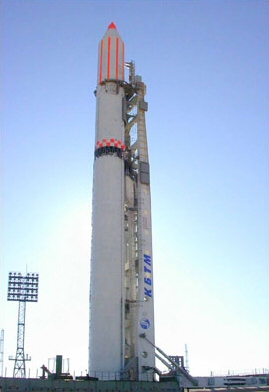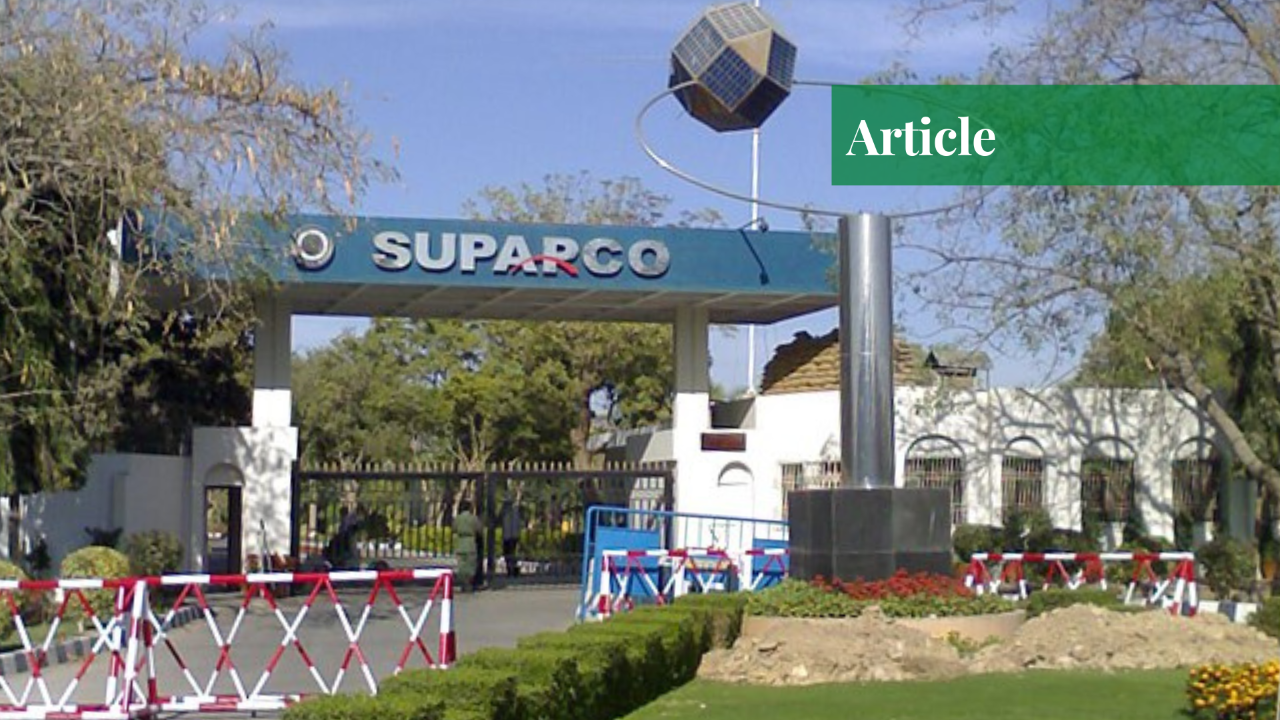Mr Abdullah Mian is an undergraduate student pursuing Physics at LUMS. He hopes to improve the quality of Pakistan's education system and advocate for rational education over an emotional one.
The Pakistan Space & Upper Atmosphere Research Commission (SUPARCO) has ambitious plans to launch two whole satellites by 2040, whereas the National Aeronautics and Space Administration (NASA) and Indian Space Research Organisation (ISRO) have comparably ambitious plans to reach the moon, Mars, and beyond within the same time period. What, you may ask, are the reasons for such drastically different objectives? Well, let’s find out.
History
Our national space organization came into being when the space race between the US and USSR was picking up pace and receiving generous funding. It was during this period, in 1961, that Pakistan Space & Upper Atmosphere Research Commission was founded by none other than Dr. Abdus Salam. SUPARCO was the first space program in the Muslim and the developing world.
It was off to an illustrious start, successfully launching an unmanned-sounding rocket just one year after its conception. This achievement made Pakistan the 10th country to achieve space-flight and the first in the Muslim world. Pakistani scientists received training offers from the United States, and a Doppler radar tracking system was set up as part of a global network.
At that time, the whole world was in awe of the limitless potential of space exploration. Pakistan was clearly on the right track at the right time, had great partners to support it (notably NASA), and had an expert team of scientists. Then what, you should rightly wonder, went wrong?
The Indo-Pak war of 1965, military coup after coup, the separation of East Pakistan and the complementary war, and general political instability and economic recession caused the space program to lose priority and fade into the background, while India developed its ISRO from scratch, gradually caught up to, and surpassed SUPARCO.
Pursuit of Nuclear Supremacy
In the ’70s, Prime Minister Zulfiqar Ali Bhutto diverted brilliant minds from the Pakistan Space & Upper Atmosphere Research Commission to the Pakistan Atomic Energy Commission (PAEC) in order to mobilize as much intellectual prowess as possible to pursue nuclear supremacy. Here, it can be argued, rather it is frequently done so, that Pakistan needed to focus its resources to construct an atomic bomb to ensure its sovereignty, but I would like to argue that this is a grave misconception.
While Pakistan focused solely on military might, India was developing both its military might and its space capabilities. The generally held consensus that investing in military might and weapons of mass destruction somehow secure a safe future is questionable in itself, but using it to justify the lack of investment in industrious science and technology is absurd. In fact, both India and Pakistan are still suffering because of this delusional arms race fueled more by ego rather than concerns for national security.
Satellites
After Zia took over, it became very unlikely that any progress would be made towards SUPARCO’s original goals. However, after the launch of India’s Aryabhatta satellite, a healthy need to compete was felt by Pakistan, and SUPARCO was rejuvenated for a short time and began to work on a communications satellite called Paksat.
However, in 1984, Zia conducted a visit to SUPARCO after which all projects were terminated, due to an apparent lack of funds. The scientists working on the program were underfunded, underappreciated, and demotivated. However, they persisted and continued struggling but only managed to secure the launch of Badr-1, an experimental low-earth orbiting satellite, which was designed to function for about 35 days, and successfully completed this period.
Badr-2 was launched in 2001, but it soon went out of control and was lost to the endless depths of space. The reasons for this failure are still unclear, and will probably remain so since no formal investigation was ever mounted. In 2002, SUPARCO bought a second-hand satellite for about 5 million USD. It was then renamed Paksat-I and redirected to Pakistan’s reserved orbital slot at 38 degrees East.

Interestingly, the then President of Pakistan, General Pervez Musharraf, considered this an “incredible success”. Upon its inauguration, he said: “This marks a tremendous achievement demonstrating the skill and technical excellence of the country’s manpower.” This begs the question: how does the purchase of a secondhand satellite demonstrate anything even vaguely related to skill or technical excellence?
Musharraf even went so far as to claim that Pakistan’s space program was now more advanced than India’s and that it would take the Indians “another 30 months to do the job”. All things aside, Paksat-I served us well, completing its expected period of service of 15 years (1996-2011). It was then replaced by the Paksat-1R, which was constructed and launched with the help of the Chinese space program in 2011.
However, it is still unclear how much of it was constructed indigenously or who bore the costs. According to an insider from SUPARCO, it was borne by the Chinese as a loan. In 2018, two more satellites, PakTES-1A (Pakistan Technology Evaluation Satellite) and PRSS (Pakistan Remote Sensing Satellite) were launched with the help of the Chinese, of which the PRSS was bought from the China Academy of Space Technology.
The two satellites mentioned above (Paksat-1R and PRSS) were launched under the Space Program 2040. According to this plan, SUPARCO will launch about 11 satellites by 2040. Incredibly, there are no plans to build our own launching mechanism or any ambitious missions beyond near-earth orbit.
We can only wonder where the world will be by 2040 when we have finished launching eleven whole satellites. Surely, ISRO or NASA cannot match the sheer scale and spirit of SUPARCO. Thankfully, we can rest assured that Pakistan will have the most advanced combat aircraft and apocalyptic nuclear weaponry in 2040. Every other form of technology is obviously unnecessary and a waste of time.
Conclusion
The saga of Pakistan’s SUPARCO tells the tale of not just a single government organization, but the collective intellectual decomposition of a nation. It was not just the goals of SUPARCO that fell but also the national standard of education, as well as the prevalence of rationality. Extremism and intolerance rose, and are currently at their peak.
It may be too late, but we must keep pushing for a change. Things began to go awry for Pakistan when it began to pursue delusional visions of power and glory, of regional and global domination. While these goals are not exactly wrong, Pakistan’s chosen path to them is. We are blinded by politicians and charlatans who preach glorified ideals, appeal to our emotions, and build entire careers out of rhetoric.
Somewhere along the way, we lost the ability to differentiate between the real world and the imagined one. Nations are not built by emotional leaders who lecture women about their clothing or through violent conquests by charlatans, but by rational leaders, who pursue goals grounded in reality. Unfortunately, it seems that we have taken the opposite route.
Today, all 220 million of us are utterly lost. Fake news from WhatsApp and Facebook spread like wildfire to all corners of the country, and most people do not possess the minimum education needed to differentiate between actual news and fake news. Our education system is crammed with outdated facts and updated propaganda.
Proper scientific education isn’t even available in the best schools of Pakistan. A large portion of our population is young, and we have completely failed to harness their potential. The few that display talent or initiative are bullied and trod-upon until they have no choice but to leave, then we criticize them further for leaving. The ones who refuse to flee are only appreciated when they die.
Free speech is stifled, gender-based crime is rising at an alarming pace. Our “leaders” are ignorant and disgraceful, best illustrated by their behavior in the National Assembly. It is not surprising then that our space program is so barren. But why should this be acceptable? Perhaps by developing and promoting our space program, we can give our people a sense of our irrelevance in the grand scheme of things. Perhaps then, we may realize the preciousness of our time and relationships.
It is said that when astronauts see the Earth from above the first time, they change. They realize how insignificant individual differences and squabbles are, and how there aren’t actually any borders. We, as a nation, severely need this realization. Pakistanis are adept at using music to manipulate emotions, we are also experts at hyping the smallest of things up to the grandest of scales.
Imagine the potential of a combination of these three being used to promote a sense of unity, peace, and global identity, instead of glorifying war and bloodshed. Imagine the excitement when our first indigenously constructed spacecraft lands on extra-terrestrial soil! Pakistan is capable of much more and possesses the tools to do so. All that remains is to put them into action, and it is our job as Pakistanis to do so.
If you want to submit your articles and/or research papers, please check the Submissions page.
The views and opinions expressed in this article/paper are the author’s own and do not necessarily reflect the editorial position of Paradigm Shift.



















